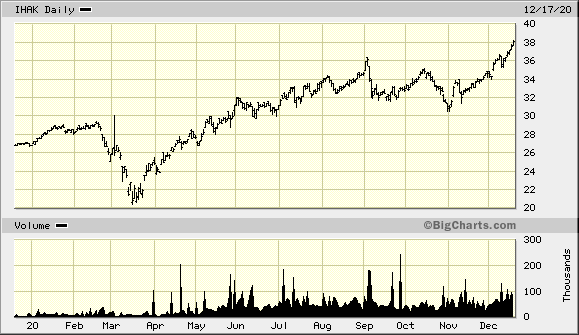Cyber security (and inflation)
December 18, 2020
–Once again, little net change in rate futures, however, bonds failed an early upside move and the thirty-yr ended up rising 1 bp to 1.675%. Most curve measures are within a bp of the year’s high, with 2/10 just over 80 bps and 5/30 just over 130. Red/gold euro$ pack spread is 72.25. DXY made a new low for the year yesterday, and ten year inflation-indexed breakeven is also at a new high, nearing 2% at 196.3.
–Philly Fed was a large miss at 11.1, but there was little effect on prices. While gold and silver have pulled back from strong rallies yesterday, Dec bitcoin remains above $23k after yesterday’s 1940 surge to 22870.
–Reports of sustained hacks on critical network systems are becoming a huge issue. The MSFT president called the SolarWinds breach an “attack of recklessness”. “The Microsoft numbers illustrate just how targeted this attack was. The hackers behind this supply chain compromise had privileged access to 18000 enterprise networks and followed up on only 40 of them.” These are nation-state hostilities that, in my opinion, eclipse the trade wars. From a CNN piece: “I woke up in the middle of the night last night just sick to my stomach.” said Theresa Payton, who served at White House Chief Info Officer under President George W Bush. “On a scale of 1 to 10, I’m at a 9 –and it’s not because of what I know, it’s because of what we still don’t know.” Friends at the The Institutional Strategist had long ago recommended Cyber-security ETFs. Maybe it’s late to the game, but check out IHAK making new highs. (There are several others as well).
–Several friends have noted that bitcoin loses a bit [ALL?] of its virtual luster in the event of an internet shutdown. On a more mundane level, security issues are necessary business inputs where costs will likely be passed on to the consumer. Here’s a clip from Gavekal’s summary of ten things that have changed last year:
To put this another way, for 20 years, every company’s procurement process was driven by the price-to-quality ratio: could a potential supplier produce an adequate product at a low enough price point. That was then. Today, after actions against Huawei, ZTE, Semiconductor Manufacturing International, the equation, at least in China (the world’s second largest economy) has changed. Above all else, what now matters most is the security of the supply and the price-to-quality ratio has slipped down the list of priorities. This represents a paradigm shift as “Ricardian optimization” is no longer the be-all and end-all. A world that worries more about safety than low prices is one that will likely deliver lower productivity, and higher prices.
–We’re worried about safety measures like masks and social distance, while dependence on network systems pervades every aspect of modern life and is met with indifference.


